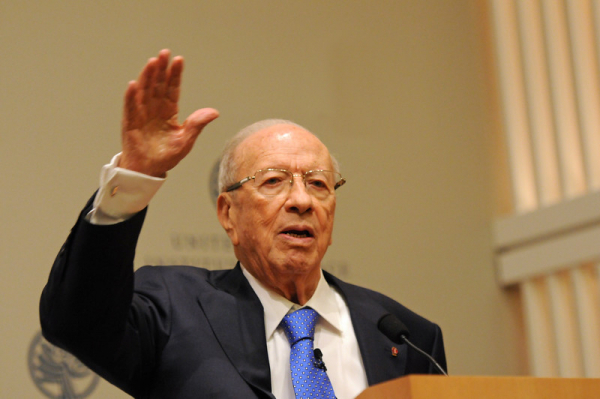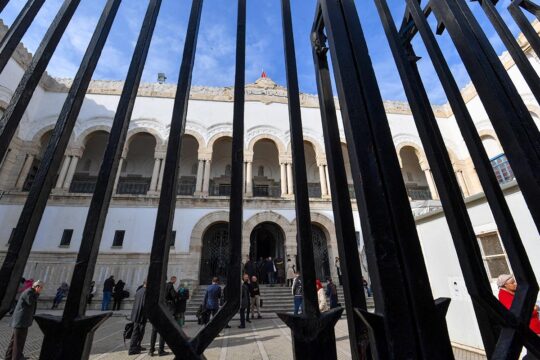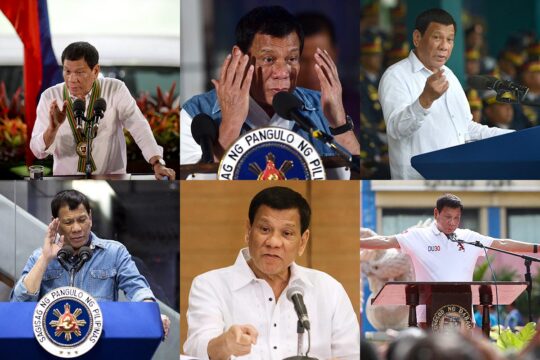In an open letter to the Tunisian president, two NGOs urge him to approve a recommendation by the Commission on Individual Liberties and Equality to scrap the death penalty.
On August 8, President Beji Caied Essebsi received a letter from the Tunisian Coalition against the Death Penalty (CTCPM) and another NGO, Together against the Death Penalty (ECPM). The two organizations bring their support for a report by the Commission (COLIBE), headed by feminist MP Bochra Belhaj Hmida, which includes abolishing the death penalty as part of the “global movement” against capital punishment. The Commission submitted two options, “either abolition of the death penalty for all crimes, so that Tunisia meets its international obligations, or at least reducing the field of application of the death penalty”. The Commission cites Article 22 of the Constitution to suggest “restricting capital punishment to the most serious crimes”.
77 prisoners sentenced to death
The 233-page report published on June 12, 2018, continues to provoke various debates, notably on equal inheritance rights, which is opposed by Muslim conservatives. And although the debate sparked by the Commission is currently focusing mainly on this point, the team led by Bochra Belhaj Hmida has the merit of raising the capital punishment issue which has been on hold in Tunisia for years.
Certainly, Tunisia has not carried out any executions since 1991, when it introduced a moratorium on this punishment. But on July 24, 2015, Parliament approved a new law on "fighting terrorism and money laundering" which widens the field of application of capital punishment by making it applicable for crimes linked to terrorism. Also, the new Tunisian Constitution maintains the death penalty. Article 21 says that "the right to life is sacred" and that it can only be violated in extreme cases defined by law. A proposed amendment to scrap the death penalty was defeated by 102 votes to 50, with 15 abstentions. Judges continue to pronounce death penalties. According to the Tunisian Coalition against the Death Penalty, 11 people were sentenced to death in 2017 and 44 in 2016. More than 77 people sentenced to death are currently in detention.
Convicts from underprivileged regions
Tunisia, which has been undergoing a democratic transition since the fall of Ben Ali’s dictatorship, had nevertheless given some signs of hope to those campaigning against the death penalty, and there was an abolitionist president, Moncef Marzouki, from December 2011 to December 2014. Another positive sign is that since 2012, the country regularly votes in favour of the UN General Assembly resolution for a universal moratorium on application of the death penalty. As a result, these convicts have since March 2011 seen an improvement in their prison conditions, as described by Chokri Latif, president of the Tunisian Coalition against the Death Penalty: “Their situation has improved a bit. They now have the right to receive visitors and are no longer isolated on death row but mix with other prisoners. That said, some prisoners are still in terrible situations, suffering isolation, psychological pressure and torture.”
The authors of a report initiated by Together against the Death Penalty
(ECPM), whose results were published in a 2012 collective work entitled The Siliana syndrome: why must the death penalty be abolished in Tunisia?”, made several findings. The most important shows that the majority of those condemned to death come from the isolated, poor and marginalized region of Siliana, in the northwest of the country. “And so this makes us aware that in Tunisia, as elsewhere, the death penalty is always an instrument of political and social repression that serves those in power,” writes Raphaël Chenuil-Hazan, president of EPCM. In their letter, the two NGOs call on the Head of State to “maintain the vote for the resolution in favour of a moratorium which takes place in December 2018 and ratify the second protocol of the International Covenant on Civil and Political Rights with a view to abolishing completely this iniquitous practice”.






